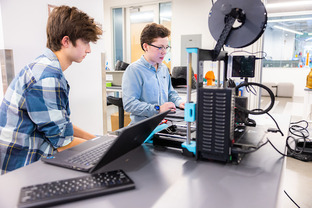»
Computer Engineering Minor
Looking to add the Computer Engineering Minor?
You can talk to a Fowler Engineering advisor to determine if it’s right for you. You can also learn how to add a minor here.
The Computer Engineering minor at Chapman provides students of all majors with the skills to design real-time, low-power, and safety-critical hardware systems. Regardless of what major it’s paired with, you’ll gain an understanding of how computation enhances and transforms technology, from embedded systems to innovative hardware solutions and more.
For students who want to shape the future of technology, this minor equips you with the skills to drive technological advancements in any field!
What you’ll learn
The minor starts with the fundamental concepts of low-level and high-level hardware design and then progresses to real-time embedded programming techniques for hardware integration.
Through the minor, you will gain skills in:
- Electricity and electronics
- Logic and circuit design
- Systems programming
- Hardware architectures
- Data communications
- Computer networks and operating systems
Curriculum and course requirements
We recommend checking the Undergraduate Catalog for the latest minor requirements. The catalog is the official curriculum guide and takes priority if there are any differences between it and other online resources, including the class list below.
On the homepage linked above, select “Dale E. and Sarah Ann Fowler School of Engineering” from the left-hand column and scroll to the “Minors” section to find the Computer Engineering minor requirements.
The Computer Engineering minor requires you to complete 28 credits in total.
All students will take 10 required courses amounting to 22 credits total:
- EENG 200: Electronics and Circuits I
- EENG 200L: Lab - Electronics and Circuits I
- CPSC 230: Computer Science I
- CENG 231: Systems Programming
- CENG 231L: Lab - Systems Programming
- CPSC 330: Digital Logic Design I
- CPSC 330L: Lab - Digital Logic Design I
- CPSC 351: Computer Architecture I
- CPSC 366: Digital Logic Design II
- CPSC 366L: Lab - Digital Logic Design II
You will then pick 2 courses from the following list of electives worth 3 credits each:
- CPSC 352: Computer Architecture II
- CPSC 353: Data Communications and Computer Networks
- CPSC 380: Operating Systems
- CPSC 465: Integrated Circuit Design I
- CPSC 466: Integrated Circuit Design II
Computer engineering clubs and organizations
Expand your experience in computer engineering by joining student clubs like the Institute of Electrical and Electronics Engineers or the Society of Women Engineers.
You can explore all of Chapman’s engineering clubs on the Engineering Clubs & Organizations page.
